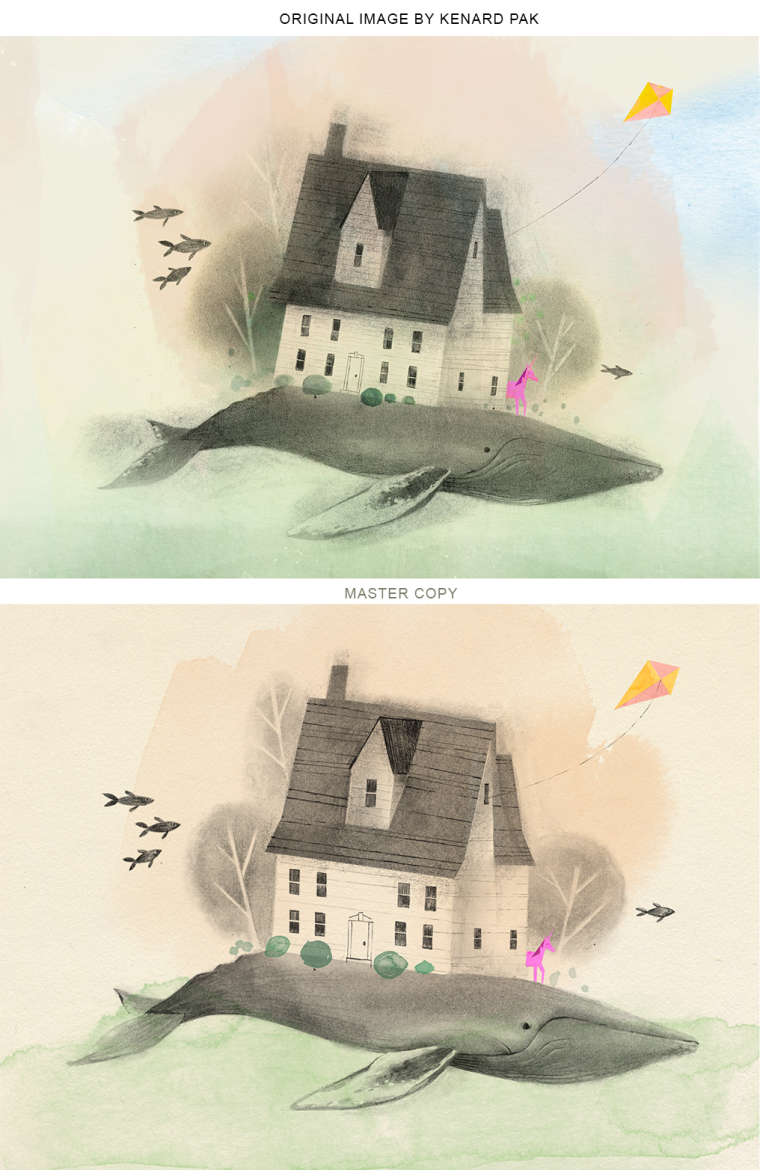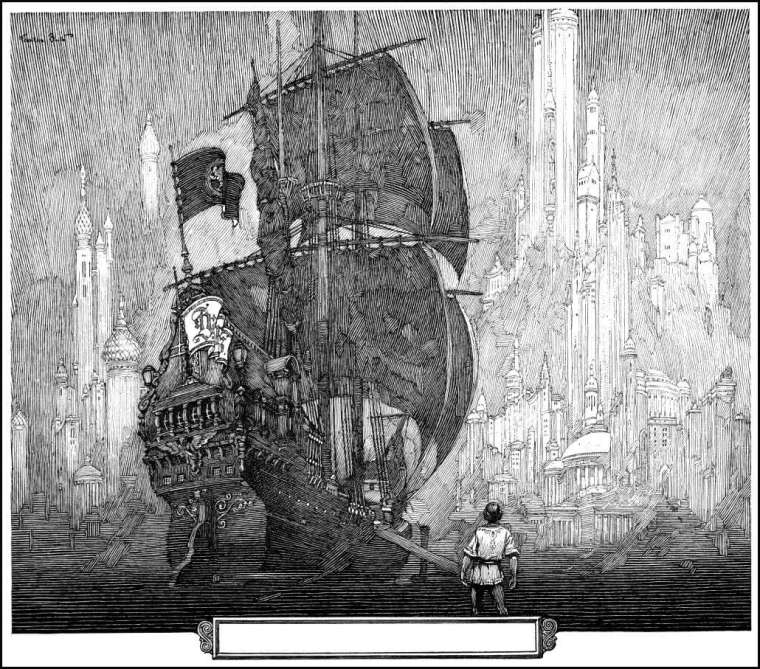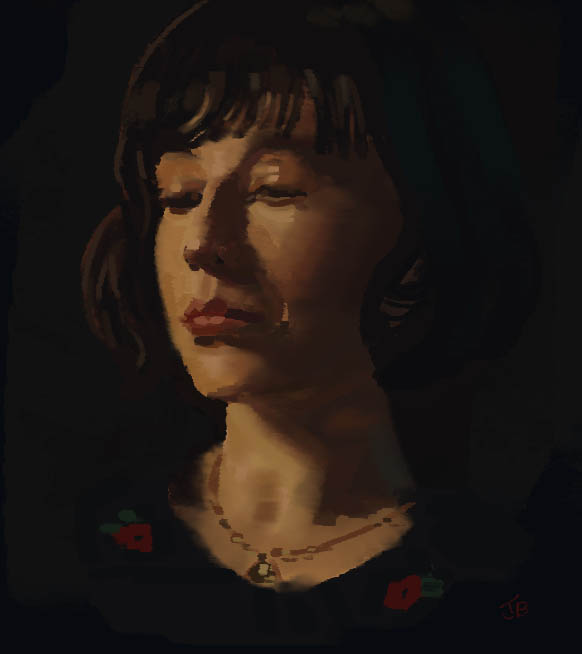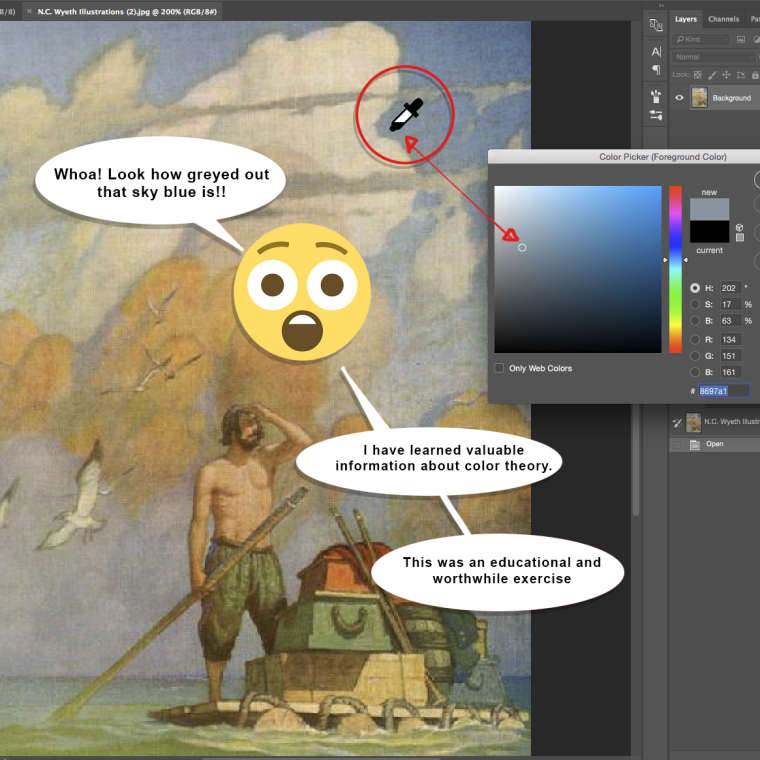Master copies -- Always useful!
-

Thought I'd share a recent master copy study. The top image is by Kenard Pak. There was a fairly spirited discussion in my agent group about mediums and techniques he used to create it, so I decided to have a go at how I would have made the image. (FYI -- a whole bunch of physical media pieces that are composed/layered digitally)
But the great bit is how master copies like this give you permission to do things that you might not otherwise think of. I will definitely be incorporating elements of this method into future work!
-
That's awesome! I've always geared my master studies more toward fundamentals like composition, perspective, etc, but I've been looking forward to the day when I'm ready to do more style based master studies.
-
@TessaW no need to wait. Go ahead and go for it. You can learn a massive amount of fundamentals by doing any master copy. Plus, it's a lot of fun! During the early stages of your education it's important not to skip the fun stuff. It keeps you motivated and makes learning less painful!
-
I want to do a master copy sooner or later, but I feel all I did for 35 years was master copies until I got to SVS. I am now just too lazy to draw someone elses work. Idk is that a unusual feeling to have? Before it was the only thing I was interested in, but that was because I could not put together a piece of my own. Whag was interesting, and probably more to the point of doing master copies, is that when I started taking all of the courses here all of those years came rushing back too me and I had felt that I had done all of this before even though I had ‘t.
What I have wanted to do for a long time is to repaint other peoples art in my own style, but not for money or anything like that, just because I feel I could learn a lot about how they compose an image. However, it feels morally problematic.
-
@Eric-Castleman Kind of like what @Lee-White wrote above -- do what's fun and interesting for you! I can't remember the last time I did a master copy, like this -- that is, a true straight-up copy. And I only did this one because of a debate about the medium/technique. But along the way turned out it was pretty fun and informative! (which is why I posted it)
But what you are talking about -- recreating other people images in your style -- that's a great idea! In fact there was recently an Instagram meme (fad? -- I dunno') called "Draw this in your Style" where artists were doing just that. So I say go for it!
The only other version that I've done recently like this is creating a new image in another artist's style. I had a go at emulating Cole's Phillips and CF Payne. Two very different illustrators with very different techniques. All of it is highly instructive!
-
I agree that master studies are really helpful. One of the many things I’ve learned from SVS classes that I wish I knew before. I recently started a copycat sketchbook. I’m trying to master pen&ink and it’s really difficult and frustrating. I’m finding that I am learning more about pen techniques by copying other’s line work than trying to figure it out on my own. My hope is that I will have a bank of shading techniques and textures stored in my brain that I can pull from when I need them for a drawing.
-
@JODY I'm reminded of Franklin Booth, who wanted to learn pen and ink. He did many copies of other artist's works. Only --- he accidentally copied wood engravings! (thought they were pen and ink pieces) Very different process. But in doing so he became one of the BEST pen and ink artists ever!

-
@jody Copycat sketchbook--GREAT idea!! I may have to do that as well.
-
@eli You should! I got the idea from one of Jake Parker’s videos. To keep a sketchbook that is just for copies. You don’t have to show anyone. They don’t have to be perfect. You can do one study over and over again. I’m trying to get into the habit of making master copies a regular part of my drawing practice. I have a cat sticker on my copycat sketchbook to identify it. Lol.

-
@davidhohn Thank you for recommending that artist. His work is beautiful! And a perfect suggestion for me as I am also a printmaker! I will take any and all suggestions of classic pen&ink artists I should study. I have only been studying pen for a year and I would like to learn about illustrators beyond instagram. I am quite fond of artists that are obsessed with detail like Aaron Horkey. But I think I will have to scaffold myself and build from simple drawings to more complex. Recently I tried a master study of one of Horkey’s simpler drawings and it did not go well..... lol. I found a book recently filled with Dorthy Lathrop illustrations so I think those will be my next studies.
-
@davidhohn Thank you so much for this post. It would never have occurred to me the value gained in doing my own master copies of artists I respect and admire. I too am a fan of Booth and I think his story is great. I might be copying some Bill Sienkewics (sp?) or Chris Van Allsburg or go whole hog and copy Franklin Booth.
-
Am I defeting the purpose of master copies if I am just digitally ripping the color from the original image and using it for my copy, or is it part of the process to try to balance the color with my own eyes?
-
I do master studies too I've learnt lots from doing it. this is my most recent one, not perfect but getting better.

-
@eric-castleman My opinion is that sampling colors digitally is valuable. Especially if you are consciously doing so. I'm always amazed when (for example) a "pure blue " color is actually just a greyish brown, but appears blue because of the color(s) next to it. All this is color theory at its finest!
-
@eric-castleman I am going to go against what david said here. I never let my students sample the original artwork. The reason is you need to start to understand what "relative color" and "relative value" are. Relative color/Relative value is how a color or value is perceived vs. what it actually is. For example, using david's "pure blue" example, you may start by actually picking a blue because that is what it looks like. But then when you put it on your painting, you will see instantly that you are way too saturated compared to the original painting. Then you have to figure out how to desaturate that blue down and that is where all the learning comes in. If you just sample the original, the original painter has already done the work for you.
-
@jason-bowen very nice! BTW, I would always suggest posting the original along with your copy when posting master copies. That way we can see how close you came and offer advice.
-
@lee-white thanks. I didn't think of that I will next time.

-
@Eric-Castleman -- And here you get to see the difference in teaching styles. While @Lee-White is certainly not wrong in his zeal to challenge students right from the start, I feel that it's just as appropriate to work up toward mixing (or choosing) the colors by eye. To clarify what I wrote earlier I think that "consciously" digitally sampling colors can be a useful way to get a handle on color theory. Especially when starting out.

-
@davidhohn This is so helpful to see. I've been glancing back and forth between the original and your copy, noticing the similarities and differences. I'm drawn to the differences (e.g., the door sizes, the angle of the main house to the roof, the sharpness or textured edges of some of the washes of color, how there's blue on the right side of the sky in the original and not in your copy) and find myself deciding which effects I prefer. For example, I much prefer some of the textured edges that appear in your copy, but I miss that bit of blue in the sky in the original. I'll try to fit in some master copies this month in my schedule. As for sampling colors from the original versus figuring it out on your own, I think that if you're working digitally, why not save time and look at the sampled color? But still make sure you understand what's happening.
-
I have students try it on their own at first, then once the copy is finished, they go back and color sample the original image to see how close they got. I feel like this is more practical in a learning environment, but definitely try both methods out and see which works for you. If you absolutely can't hit a color in your master copy, then sample it and evaluate it like david says. Avoid mindless sampling though, that is a crutch that is cheating! : )